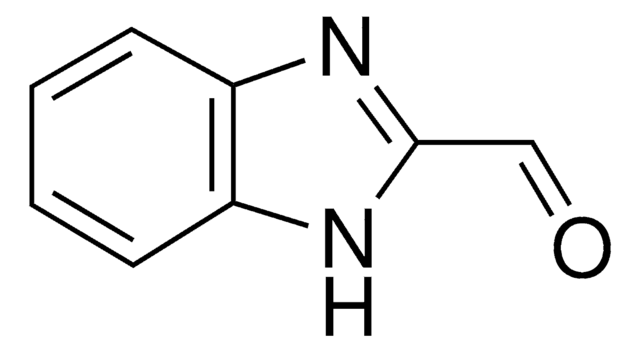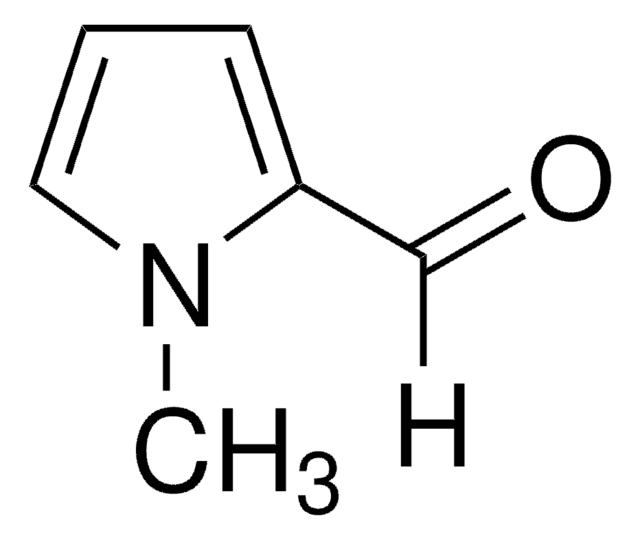All Photos(3)
About This Item
Empirical Formula (Hill Notation):
C5H6N2O
CAS Number:
Molecular Weight:
110.11
MDL number:
UNSPSC Code:
12352005
PubChem Substance ID:
NACRES:
NA.22
Recommended Products
Assay
98%
bp
70-74 °C/1 mmHg (lit.)
mp
36-39 °C (lit.)
SMILES string
[H]C(=O)c1nccn1C
InChI
1S/C5H6N2O/c1-7-3-2-6-5(7)4-8/h2-4H,1H3
InChI key
UEBFLTZXUXZPJO-UHFFFAOYSA-N
General description
1-Methyl-2-imidazolecarboxaldehyde is a heterocyclic building block. It affords tripodal ligands on condensation reaction with tris-(2-aminoethyl)amine (tren). These tripodal ligands react with iron(III) salts in the presence of air to afford iron(II) complexes. Its vibrational spectral studies have been reported.
Application
1-Methyl-2-imidazolecarboxaldehyde may be used in the synthesis of:
- Schiff bases
- ligand N,N-dimethyl-N′-(1-methylimidazole-2-ylmethyl)-ethylenediamine
- [(bis(1-methylimidazol-2-yl)methyl)(2-(pyridyl-2-yl)ethyl)amine]
Signal Word
Warning
Hazard Statements
Precautionary Statements
Hazard Classifications
Eye Irrit. 2 - Skin Irrit. 2 - STOT SE 3
Target Organs
Respiratory system
Storage Class Code
11 - Combustible Solids
WGK
WGK 3
Flash Point(F)
215.6 °F - closed cup
Flash Point(C)
102 °C - closed cup
Personal Protective Equipment
dust mask type N95 (US), Eyeshields, Gloves
Certificates of Analysis (COA)
Search for Certificates of Analysis (COA) by entering the products Lot/Batch Number. Lot and Batch Numbers can be found on a product’s label following the words ‘Lot’ or ‘Batch’.
Already Own This Product?
Find documentation for the products that you have recently purchased in the Document Library.
Customers Also Viewed
Synthesis and characterization of tripodal iron (II) complexes prepared from 2-pyridinecarboxaldehyde and 1-methyl-2-imidazolecarboxaldehyde: stabilization of iron (II) cations with N 6 donor sets.
Brewer G, et al.
Inorgorganica Chimica Acta, 357(8), 2390-2396 (2004)
Synthesis, crystal structure and redox properties of bis-imidazolyl-containing copper (II) complexes.
Musie GT, et al.
Inorgorganica Chimica Acta, 348, 69-74 (2003)
DFT, FT-IR and FT-Raman investigations of 1-methyl-2-imidazolecarboxaldehyde.
Polat T and Yurdakul S.
Journal of Molecular Structure, 1053, 27-37 (2013)
Structural, spectroscopic and redox studies of a new ruthenium (III) complex with an imidazole-rich tripodal ligand.
Scarpellini M, et al.
Inorgorganica Chimica Acta, 357(3), 707-715 (2004)
Iron (III) complexes of sterically hindered tetradentate monophenolate ligands as functional models for catechol 1, 2-dioxygenases: The role of ligand stereoelectronic properties.
Velusamy M, et al.
Inorganic Chemistry, 43(20), 6284-6293 (2004)
Our team of scientists has experience in all areas of research including Life Science, Material Science, Chemical Synthesis, Chromatography, Analytical and many others.
Contact Technical Service










